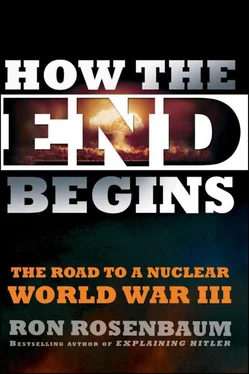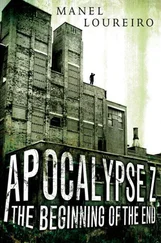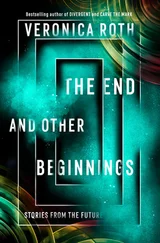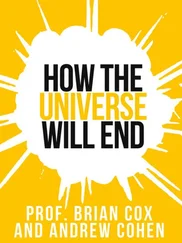Next time, should there be a second Holocaust, Jews will have the means to inflict massive retaliation, they will have the choice at least, it will be by choice and that choice may well come down to a submarine commander. The last resort of choice.
Should he retaliate, regardless of his orders? Several years ago I gave a talk to a seminar sponsored by the Yale Interdisciplinary Initiative for the Study of Anti-Semitism about the idea of a second Holocaust and the controversy over it. [232]And, at the end, the issue of retaliation came up.
One speaker addressed the question of whether the Israelis had provided for it and shielded their retaliatory forces. He told the story of the Isaiah scroll in Jerusalem’s Shrine of the Book, the repository for the most ancient and revered manuscripts of the Jewish people, and how the Isaiah scroll, after a brief period of being on display in a super-hardened glass case, retracts deep, deep into the earth, into the titanium steel alloy silo you might say, that reaches far beneath the surface and is said to be able to survive a direct nuclear blast. They care about books there. You can’t use your library card to get the Isaiah scroll. The point he was making was that the Israelis guarded their retaliatory capacity with the same care as the Isaiah scroll and that was saying something.
Until the very end of the question and comment period no voices had been raised to question the fact that there would or should be retaliation. Then a grad-student-looking fellow at the back of the room spoke up and in a halting, tentative voice framed his question this way:
What if the Jews didn’t retaliate at all? What if they, the survivors, somehow declared there would be nothing to be gained, only a preponderance of innocent lives to be lost among the guilty perpetrators. Wouldn’t the Jews—however few were left alive—be honored then and for centuries afterward for this forbearance?
Interesting choice of words: honored. I thought of Falstaff: “What is honor?”
Before I could answer, a fellow on the side of the room spoke up and said such talk, or a public airing of it, would be dangerous because it would undermine the credibility of Israel’s deterrent, which depended on the certainty of retaliation. Not that anyone in that room was going to be giving the order.
I didn’t have an answer for either one of them. I felt in part the terror the Jewish Theological Seminarians felt. What if you don’t know what to think about the question of retaliation.
It just so happened that on July 3, 2009, the Jerusalem Post printed a dispatch about one of Israelis nuclear-capable Dolphin-class submarines. [233]Israeli papers are not allowed to acknowledge possession of nuclear weapons by the state and so the dispatch was muted, although the reverberations must have been pronounced for those in the know about the role of the Dolphins as the Israeli launchers of last resort. “After a long hiatus the Israeli Navy has returned to sail through the Suez Canal,” the story said, “recently sending one of its advanced Dolphin class submarines through the waterway to participate in naval maneuvers off the Eilat Coast in the Red Sea.”
A message was being sent. A message about retaliation. And the means to do it. But what about the will to do it, the morality of the choice? And so as I write this a submarine that could start (or end) World War III is cruising into range. And no one knows what the commander thinks about the consequences of a second Holocaust. Or whether he carries a Letter of Last Resort.
It took me a while, but at last I found someone who was an authority on the ethics of the question and the military implications there of someone who was willing to talk about what was “new under the sun.”
MOSHE HALBERTAL: THE DETERMINATE VERSUS THE IMMEASURABLE
“Do you think it’s wrong to write about this?” I asked Moshe Halbertal toward the end of our talk.
We were sitting in his office at NYU Law School where he spends half the academic year teaching ethics and the international law of war; the other half he does the same at Hebrew University in Jerusalem. He is one of the most widely respected thinkers on the moral and ethical dilemmas of modern warfare. He was influenced by the writings of Michael Walzer, the author of the influential book Just and Unjust Wars: A Moral Argument with Historical Illustrations. [234]And Halbertal’s gotten involved in a way that is more difficult and perilous than academic: he’s co-written the code of ethics for the IDF, the Israel Defense Forces.
He admitted he had not written about how just war ethics apply to nuclear war questions. He admitted he felt he was entering into a “no-man’s-land… beyond the law.” [235]Occasionally he would say variations of “but you can’t say that” after he’d said it. Which is why I asked him if I should write about it.
We had been speaking as well about his shocking-at-first notion that a preemptive nuclear strike might be a morally justifiable act under certain restrictive conditions involving “thresholds” and “supreme emergencies.” We had been talking about submarines, the retaliatory weapons of last resort. And so I found myself asking in a guilty way whether deterrence was—or should be—a bluff, something you threaten but aren’t allowed to carry out, as Walzer believes. But of course even to discuss it is to make an attack by a foe more tempting should he think the threat might be a bluff.
“Wrong to write about it?” I asked. “Not that anyone is going to pay attention,” I hastily added, not wishing to risk being held responsible for a nuclear cataclysm, “but—”
“No, not at all, you should, you should definitely—”
“No one in Iran is going to say—”
“No I don’t think you’ll break the…”
He trails off but I think he means to break the veil of secrecy or the shroud of ambiguity that cloaks Israeli nuclear war plans, even nuclear weapons possession.
Halbertal was just the person I had been seeking to talk to, a much admired Talmudic scholar most well known among the Talmudists for his book on idolatry [236]who had brought his immersion in the wisdom of the sages to contemporary military ethics. He is deeply knowledgeable about the whole tradition of just war theory, but willing to acknowledge that nuclear weapons presented new challenges to ancient conundrums. Something new under the sun.
He is a modest shirt-sleeved fiftyish guy who says dramatic things in an offhand undramatic manner and is frank about his hesitancy, uncertainty, and agony on certain matters. He comes across as a someone of genuine humility who admits to being tentative. He’s a serious and courageous man.
I began by asking Halbertal to describe how his military experience led him to his current position. He told me that he had enlisted in the Israeli army and served as an artillery spotter. In other words his task was both military and ethical: to make distinctions—often difficult and immensely consequential ones—between civilian and military targets in the grim struggles of “irregular warfare” where decisions were not always possible with precision. The artillery spotter is a battlefield ethicist who puts his life on the line getting to the forward-most position for the sake of saving innocents. A position where to make the wrong choice is to risk killing innocents.
He told me our conversation was his “first extended” one on something he had been thinking about but had not addressed formally. “All this has become unfortunately very real,” he said. He’s talking about Iran and what Israel will have to do about it. Ten days after Halbertal and I spoke the following report [237]appeared on a Web site called DEBKAfile known to be a conduit for Israeli information and disinformation. It’s not clear which this was, but since Israel does not officially admit to having nuclear weapons, it was remarkably detailed technically. That doesn’t mean the voyage described wasn’t manufactured out of whole cloth. But if so it was designed to paint a picture for the Iranians of a voyage that could take place:
Читать дальше











